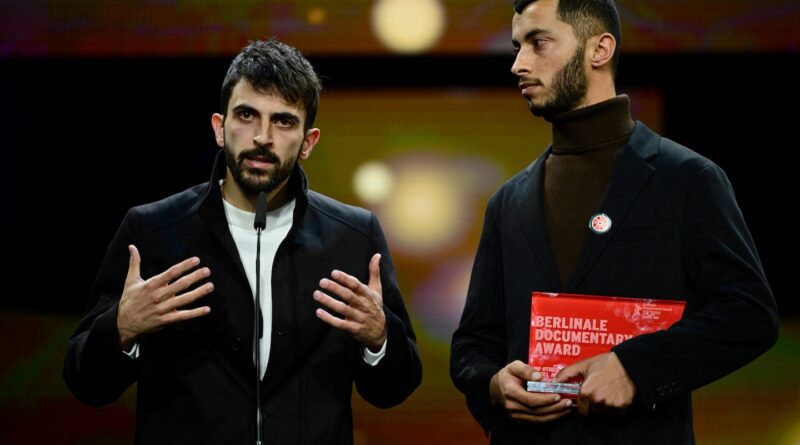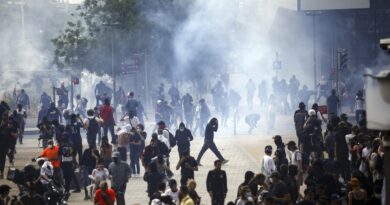Israeli filmmaker engulfed in backlash after antiwar speech in Berlin
Standing beside his Palestinian co-director at the Berlinale film festival over the weekend, Abraham, 29, criticized his government’s treatment of Palestinians, saying: “In two days, we will go back to a land where we are not equal. … We need to call for a cease-fire.”
Earlier, the co-director, Basel Adra, had said that it was “very hard for me to celebrate when there are tens of thousands of my people being slaughtered and massacred,” calling upon Germany to end weapon exports to Israel.
In response, German politicians criticized the onstage remarks as “one-sided” and blamed the festival’s organizers for letting the remarks go unchallenged. Berlin Mayor Kai Wagner tweeted that the remarks were “unacceptable” and that antisemitism “has no place in Berlin,” adding that he expected festival organizers “to ensure that such incidents do not happen again.” Germany’s cultural commissioner, Claudia Roth, said she was working with city officials to review the festival’s handling of the incident.
The backlash has once again spotlighted modern Germany’s hard-line approach to criticism of Israel, which has been tested by the increasingly febrile atmosphere following Hamas’s Oct. 7 attack and Israel’s ensuing war. Politicians there regularly say that the nation has a historical responsibility to offer its unflinching support to the Jewish state, calling it a “Staatsräson” — reason of state.
In a telephone interview Wednesday, Abraham said he had received death threats and hateful messages in response to his speech. As he prepared to board his flight home to Israel, he was contacted by people who threatened to meet him upon arrival at the airport. He has since canceled his flight, saying, “I understood that I can’t go back.”
Abraham and Adra’s film, titled “No Other Land,” won the Berlinale Documentary Award. In the film, Abraham and Badra document life in a Palestinian village in the occupied West Bank while also examining the way their own relationship — as an Israeli and Palestinian of the same age — was strained by inequalities.
Abraham said the documentary was intended to prompt debate and that he respected those who disagreed with him. “But to demonize us, to devalue the term of antisemitism like that,” Abraham said, “how dare German politicians tell an Israeli whose entire family either survived or was murdered in the Holocaust?”
Abraham, who describes himself as a Jewish descendant of Holocaust survivors, rejected any suggestion that his remarks at the awards show were antisemitic. “We stood on the stage together, an Israeli and a Palestinian calling for equality, calling for ending the war.
“The branding of these positions as antisemitism by German politicians who are not Jewish,” he added, “placed me and my Jewish family in danger.”
Germany’s culture and media department issued a statement after its commissioner was filmed clapping in the audience after Abraham and Badra delivered their speeches. “Claudia Roth’s applause was for the Jewish-Israeli journalist and filmmaker Yuval Abraham, who spoke out in favor of a political solution and peaceful coexistence in the region,” the department said.
On Instagram, Roth criticized the award speeches for failing to mention Hamas’s Oct. 7 attack and hostage taking. She said she was working with Berlin’s mayor and senate to “evaluate overall how the Berlinale lives up to its claim of being a place of diversity, of different perspectives, of dialogue.”
On Oct. 7, Hamas-led militants killed an estimated 1,200 people, mostly civilians, in Israeli communities near Gaza, and took 253 more hostage, according to Israeli authorities. In response, Israel’s military launched a campaign that has since killed more than 29,000 people and wounded more than 70,000, according to Gazan authorities.
As tensions mount around the conflict, cultural events have become a lightning rod for simmering discontent in Germany — pitting those who accuse organizations of bias against others who protest their right to artistic freedom. Pro-Palestinian protests were largely banned in Germany in the weeks after Israel sent troops into Gaza, and some artists have seen their exhibitions canceled by organizers with the intention of steering clear of anything that might be deemed antisemitic.
Israel’s ambassador in Berlin, Ron Prosor, accused Germany’s cultural institutions of “rolling out the red carpet” for anti-Israel activists over the weekend. “Under the guise of freedom of expression and art, anti-Semitic and anti-Israel rhetoric is celebrated,” he said in a post on X.
In a statement this week, the festival’s organizer, Mariëtte Rissenbeek, said the positions expressed at the award ceremony did not reflect the festival’s position. “We understand the outrage that the statements made by some of the award winners were perceived as too one-sided and, in some cases, inappropriate,” she said, adding that it would have been more “appropriate” if award winners and guests offered “more differentiated statements on this issue.”
Berlin’s mayor and Germany’s commission for culture and media did not immediately respond to requests for comment.
Separately, the festival said one of its Instagram accounts was hacked on Sunday, resulting in “antisemitic image-text posts” about the war. “These statements do not originate from the festival and do not represent the festival’s stance,” the festival said.
Kate Brady and Lior Soroka contributed to this report




